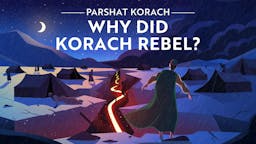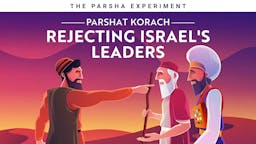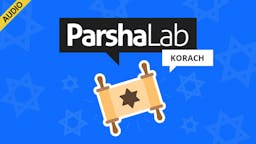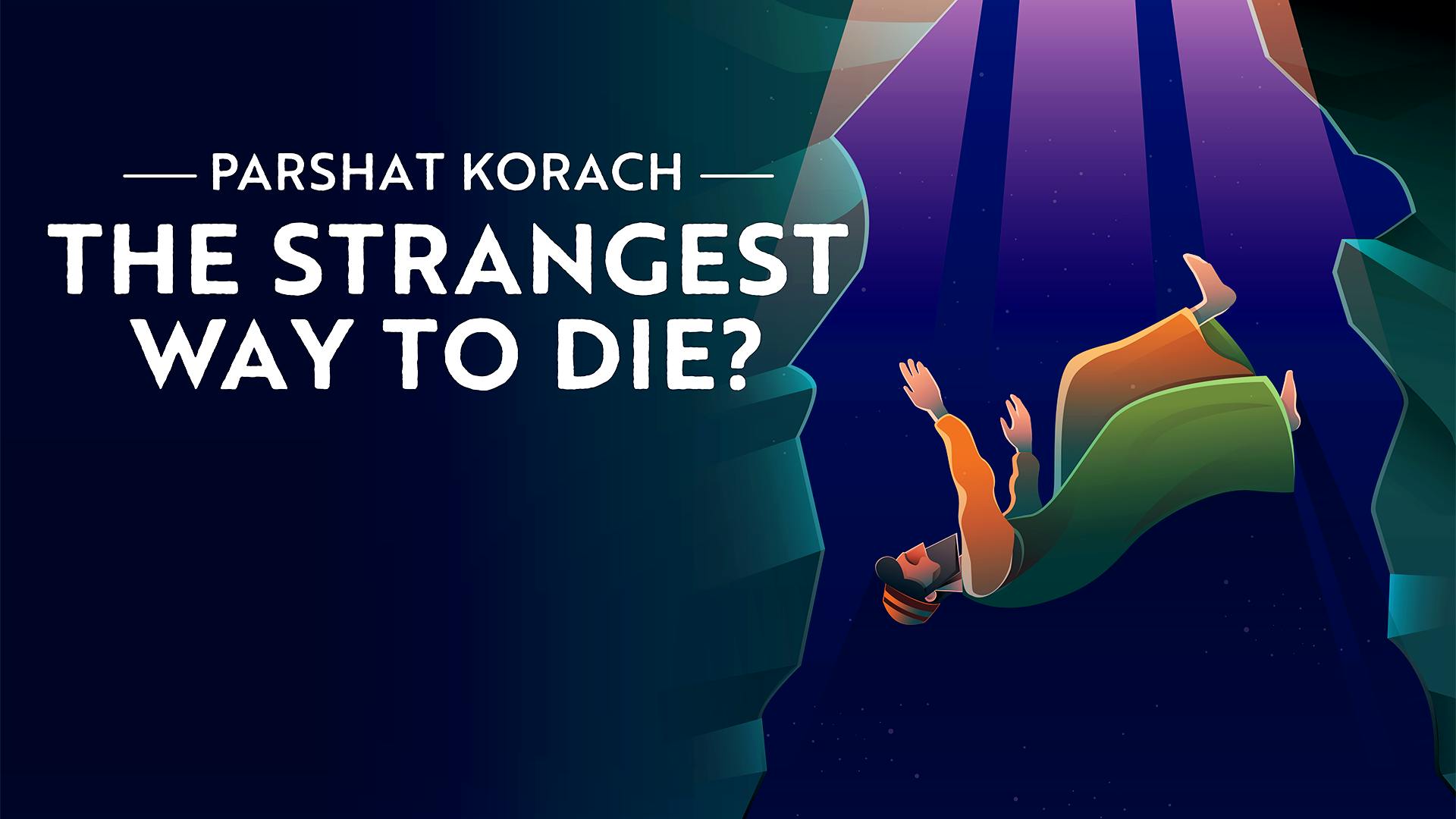D’var Torah Parshat Korach
Understanding Korach’s Motives and Punishment
By Evan Weiner | 5 June 2024 | 6 Minute Read
Why Did the Earth Have to Swallow Up Korach?
Korach’s miraculous punishment
Parshat Korach contains one of the most openly miraculous events in the entire Torah. In the words of the Torah, “the earth opened its mouth and swallowed up Korach, his household, and all his belongings” (Numbers 16:32). The Torah isn’t just describing an earthquake that randomly occurred right at the moment Moshe said it would and struck coincidentally right under Korach’s household. This was an open miracle God brought as a punishment for Korach’s rebellion against Moshe and Aharon. This was a serious crime, and Korach was swiftly punished for his actions. But there are a few things that have always bothered me about this story. Firstly, why did God choose this way to get rid of Korach? I’ll explain what’s bothered me about this for so long. God has no shortage of special methods to kill wrongdoers. I mean, against the Israelites alone, the Torah tells us about a few ways God miraculously exacts justice: there’s the classic plague of sickness; in Parshat Chukat we’ll read about poisonous serpent bites; and another popular choice has been zapping wrongdoers with fire. So, why didn’t God use any of those go-to methods for disposing of Korach? Why did God have to make the earth swallow Korach alive? That’s my first question, but there’s more.
What was Korach’s argument?
There’s another thing about Korach’s punishment that has always plagued me (in a figurative sense - no illness, snakes, fire, or earthquakes, thank God): Why in the world did he need to be punished in the first place? I know that sounds like a ridiculous question because we’re so used to thinking about Korach as a nasty rebel, fomenting dissent among the Israelites. But if you just read his argument, there’s something that feels…well, right. He asserted to Moshe and Aharon that “כִּי כׇל־הָעֵדָה כֻּלָּם קְדֹשִׁים וּבְתוֹכָם יְקוָה” – “the whole nation is holy and God dwells in all of them” (Numbers 16:3). When you think just about the content of what he’s arguing, it actually seems in line with messages that God Himself has sent to the Israelites about them being holy (Shemot 19:6) and God dwelling among them (Shemot 25:8). So what was so off about his argument? Why did he deserve such a harsh punishment?
Why did Korach rebel?
We’ve asked about the nature of and the need for Korach’s punishment, but here’s yet another question that’s always been on my mind: why did Korach rebel in the first place? What led him to be so dissatisfied that he wanted to mount a rebellion against God’s chosen prophet? I mean, Moshe and Aharon managed to topple the world’s biggest superpower with the most amazing plagues. They led the Israelites through the desert, securing miraculous food and water, but Korach thinks that’s not good enough?!? What was his real issue with them? Was it something unique about Korach? What is the backstory to Korach and his rebellion?
To discover a whole new way to understand Korach’s rebellion – the antecedents, the arguments, and the consequences – check out this video in which the Aleph Beta team digs deep into the story and uncovers a fascinating new perspective on this powerful story.
Parshat Korach in a Nutshell
Parshat Korach tells the tragic story of Korach’s rebellion, in which he challenges Moses’ and Aaron’s leadership. As a test and demonstration of who should be God’s chosen leader, Moses instructs Korach and his followers to bring firepans of incense and whomever’s offering is accepted will reveal that he is God’s chosen leader. Datan and Aviram, two members of Korach’s rebellion, blatantly defy Moses’ overtures of reconciliation, and the “showdown” moves forward. Moses warns the nation to distance themselves from Korach and his followers, and immediately afterwards, the ground opens up and swallows Korach and a fire consumes his 250 followers.
The next day, the nation again complains to Moses and Aaron, claiming that they are killing everyone. God decides to send a plague to kill the people, but Moses and Aaron defend the people and stop the plague. There is another test of Aaron’s legitimacy as Kohen Gadol. This time each tribe is to place the staff of its leader in the Tabernacle. Only Aaron’s staff sprouts, thus confirming him as the rightful Kohen Gadol.
The parsha concludes with a few sets of laws: a) further instructions to Aaron and his sons as the kohanim about safeguarding the Mishkan (Tabernacle) and its vessels, b) the list of gifts that should be given to the kohanim as a reward for their service in the Mishkan, and c) tithes that should be given to the Levites in reward to their service as well.
More Parshat Korach Videos

Does God Want Us to Change His Mind?
Video • 11 min
Can we cheat death? Sometimes God tells humans when He intends to kill, but that could be an invitation to try to convince God to do otherwise. Rabbi Fohrman explains two humorous but bizarre Midrashim recounting different interactions with the angel of death, and the possibility of thwarting its plans.

When Grief Turns Destructive
Video • 14 min
You can’t blame the Jewish People for feeling some despair after being condemned to die in the desert. But sometimes grief turns ugly, and that’s exactly what happened to Korach and his followers.

The Control Illusion: What Korach Reveals About Trust
Video • 14 min
Korach's rebellion comes right after the spies' devastating punishment — how could Israel forget so quickly? The answer will change how you see every complaint in the desert. What if the people weren't really rebelling against Moses and Aaron at all? Discover the shocking pattern that makes Korach's "holy" rebellion inevitable.

Where Did The Rebellion Start?
Video • 32 min
In Parshat Korach, there’s a sudden rebellion against Moses and Aaron. Korach, the leader of the rebellion, argues that all Israelites are holy, not just Moses and Aaron. But where did his distrust of Israel’s leaders come from? Join Rabbi Fohrman and Ami Silver as they re-examine Korach’s family origin, which is recorded in the text, and see how his upbringing may have played a significant role in the rebellion.
More Parshat Korach Printable Learning Guides
Also Check Out These Pages:
What is Aleph Beta?
Aleph Beta is a unique kind of Torah library. Led by our founder, Rabbi David Fohrman, we are dedicated to high-level, textual Torah learning for adults that is intellectually and spiritually sophisticated, that enlivens your Jewish practice and helps you forge a deeper connection to God. Whether you’ve been learning in yeshiva for years or you’re just beginning your Torah journey, you’re sure to find something meaningful and surprising waiting for you here.
Browse our library of over 1,000 beautifully produced animated videos, podcasts, deep dive courses, and printable guides. Topics include the weekly parsha, Jewish holidays & fast days, laws & mitzvot, prayers, relationships, big philosophical ideas and more. Have something to say at the Shabbos table that will amaze your family and guests and bring deep meaning into their lives.


